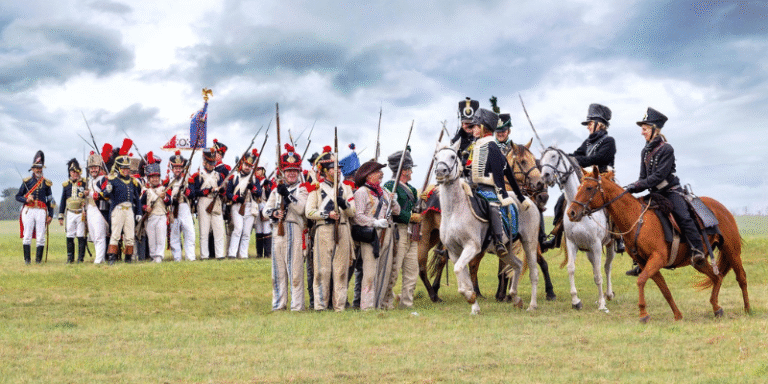The Napoleonic Wars (1803–1815) were among the most transformative conflicts in European and global history. Sparked by the ambitions of Napoleon Bonaparte and the tumult of revolutionary France, these wars reshaped political boundaries, disrupted global economies, and catalysed lasting changes in military tactics and national identity. This article offers a comprehensive, yet accessible, exploration of the causes, key events, and consequences of the Napoleonic Wars.
Origins and Causes of the Napoleonic Wars
The roots of the Napoleonic Wars lie in the French Revolution (1789–1799), which challenged the absolute monarchies of Europe and sought to export republican ideals. Monarchies across the continent viewed revolutionary France as a destabilising threat to their own rule. The execution of King Louis XVI in 1793 intensified these fears, leading to a series of coalitions formed to suppress revolutionary France (Rothenberg, 2017).
Napoleon’s rise to power in 1799 as First Consul—and later Emperor in 1804—marked a shift from revolutionary to imperial ambitions. While France initially fought to defend revolutionary ideals, Napoleon increasingly pursued expansionist goals, seeking to reshape Europe under French hegemony (Mikaberidze, 2020). Additionally, economic rivalries, territorial disputes, and nationalism further fuelled hostilities among European powers (Levy, 1985).
Major Conflicts and Campaigns
The Napoleonic Wars consisted of a series of campaigns fought between France and various coalitions of European nations. Some of the key conflicts included:
- War of the Third Coalition (1805): Napoleon’s greatest triumph came at the Battle of Austerlitz, where he decisively defeated the Russian and Austrian armies. This battle demonstrated his military genius and disrupted the European balance of power (Esdaile, 2019).
- Peninsular War (1808–1814): Spain and Portugal became battlegrounds for French and British forces. Guerrilla warfare and British support under the Duke of Wellington eroded French control, making the war a costly quagmire for Napoleon (Connelly, 2012).
- Russian Campaign (1812): Napoleon’s disastrous invasion of Russia is often seen as the turning point. Despite initial victories, his army was decimated by logistical failures, harsh winters, and Russian tactics of scorched earth (Lieven, 2010).
- Battle of Leipzig (1813) and Waterloo (1815): The Battle of Leipzig marked the beginning of Napoleon’s decline. His final defeat at Waterloo in 1815 by British and Prussian forces ended the Napoleonic era (Chandler, 2009).
Economic and Social Impact
The Napoleonic Wars had far-reaching economic repercussions. Trade disruptions caused by the British naval blockade and Napoleon’s Continental System strained economies across Europe, particularly in France and its allies. O’Rourke (2006) argued that these wars significantly impeded industrial growth by limiting trade and causing inflation.
On the social front, conscription policies and widespread destruction left deep scars on civilian populations. The wars mobilised unprecedented numbers of men, contributing to the development of modern mass armies. As Bell (2007) suggests, the Napoleonic Wars were among the first “total wars,” engaging entire populations and economies.
Technological and Military Innovations
Napoleon’s military reforms revolutionised warfare. He reorganised the French army into corps, which were smaller, self-sufficient units capable of rapid movement. This allowed for greater tactical flexibility and coordination in battle (Rothenberg, 1980).
Artillery use became more systematic and central to strategy. Logistics, road-building, and supply chains improved significantly during this period. These innovations influenced military doctrines well into the 19th century (Howard, 2009).
Political and Geopolitical Consequences
The Napoleonic Wars redrew the map of Europe. France’s occupation and reorganisation of German and Italian states contributed to the rise of nationalism, which would later play a pivotal role in unification movements (Hagemann, 2015). The Congress of Vienna (1815) aimed to restore a balance of power, leading to nearly a century of relative peace among major powers—often referred to as the Concert of Europe (Gates, 2011).
In Latin America, Napoleon’s invasion of Spain weakened colonial control and inspired independence movements. Similarly, his actions indirectly stimulated political reform across Europe, especially in constitutional monarchies like Britain (Woolf, 2002).
Legacy and Cultural Memory
Napoleon remains a controversial figure—revered for his military brilliance and reforms, but criticised for his authoritarianism and wars of aggression. His Civil Code standardised legal systems in many parts of Europe and survives in modern legal codes, particularly in France and Italy (Mikaberidze, 2020).
Culturally, the Napoleonic era influenced literature, art, and music. The romantic movement was shaped partly by the turmoil and heroism of the era, as seen in the works of Beethoven, Tolstoy, and Byron.
The Napoleonic Wars reshaped Europe and the wider world in profound ways. From igniting nationalism to modernising warfare and law, their impact endured long after Napoleon’s final defeat. Understanding these conflicts provides valuable insight into the evolution of modern Europe and international relations. The Napoleonic Wars serve not only as a case study in leadership and ambition but also as a pivotal chapter in the narrative of global history.
References
Bell, D.A. (2007). The First Total War: Napoleon’s Europe and the Birth of Warfare as We Know It. Houghton Mifflin.
Chandler, D.G. (2009). The Campaigns of Napoleon. Scribner.
Connelly, O. (2012). The Wars of the French Revolution and Napoleon, 1792–1815. Routledge.
Esdaile, C. (2019). The Wars of Napoleon. Routledge.
Gates, D. (2011). The Napoleonic Wars 1803–1815. Pimlico.
Hagemann, K. (2015). Revisiting Prussia’s Wars Against Napoleon. Cambridge University Press.
Howard, M. (2009). War in European History. Oxford University Press.
Lieven, D. (2010). Russia Against Napoleon: The Battle for Europe, 1807–1814. Penguin.
Mikaberidze, A. (2020). The Napoleonic Wars: A Global History. Oxford University Press.
O’Rourke, K.H. (2006). ‘The Worldwide Economic Impact of the French Revolutionary and Napoleonic Wars, 1793–1815’. Journal of Global History, 1(1), pp. 123–149. https://www.tcd.ie/Economics/staff/orourkek/offprints/JGH%202006.pdf
Rothenberg, G.E. (1980). The Art of Warfare in the Age of Napoleon. Indiana University Press.
Rothenberg, G.E. (2017). ‘The Origins, Causes, and Extension of the Wars of the French Revolution and Napoleon’. In Warfare in Europe 1792–1815. Routledge.
Woolf, S. (2002). Napoleon’s Integration of Europe. Routledge.
Levy, J.S. (1985). ‘Theories of General War’. World Politics, 37(3), pp. 344–374. https://fas-polisci.rutgers.edu/levy/articles/1985%20Theories%20of%20General%20War.pdf









